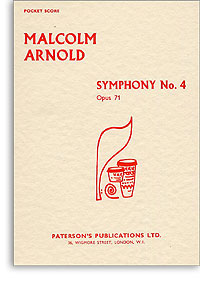Symphony No. 4 (Arnold)
This article includes a list of references, related reading, or external links, but its sources remain unclear because it lacks inline citations. (April 2020) |

The Symphony No. 4, Op. 71 by Malcolm Arnold was finished on 13 July 1960. It is in four movements:
I. Allegro
II. Vivace ma non troppo
III. Andantino
IV. Con fuoco
The work was commissioned by William Glock for the BBC. The composer conducted the first performance with the BBC Symphony Orchestra on 2 November 1960 at the Royal Festival Hall.
The composer wrote in 1971 that the symphony was a reaction to the Notting Hill race riots of 1958. He was appalled that such a thing could happen in Britain. And expressed his hope that it might help to spread the idea of racial integration.[citation needed]
Instrumentation
The symphony is scored for the following large orchestra:
Piccolo, 2 flutes, 2 oboes, 2 clarinets, 2 bassoons, contrabassoon, 4 horns, 3 trumpets, 3 trombones, tuba, timpani, bass drum, snare drum, bongos, tom-toms, maracas, tam-tam, marimba, celesta, harp and strings.
Commercial recordings
- 1974 Malcolm Arnold and the BBC Symphony Orchestra on ARIES LP (Bootleg of the 2nd performance in 1960, the credits on the LP are bogus)
- 1990 Malcolm Arnold and the London Philharmonic Orchestra on Lyrita SRCD.200 (Lyrita's first CD only release)
- 1994 Richard Hickox and the London Symphony Orchestra on Chandos Records CHAN 9290
- 1996 Vernon Handley and the Royal Liverpool Philharmonic on Conifer Records 75605-51258-2 (re-released on Decca 4765337)
- 1998 Andrew Penny and the RTÉ National Symphony Orchestra on Naxos Records 8.553739 (recorded 13–14 June 1996, in the presence of the composer)
References
- Chester-Novello page on the Symphony Contains programme notes by the composer.
- Malcolm Arnold writing in The Listener, 14 October 1971
